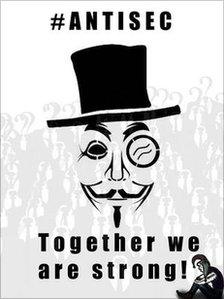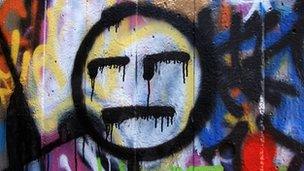Anti-Sec: Who are the world's most wanted hackers?
- Published

Anti-Sec has defaced websites, stolen data and embarrassed computer security firms
It is not just the Arab world that has had an uprising of political consciousness over the last 18 months. The net has had one too in the amorphous shape of Anonymous.
The loose and chaotic coalition that grew out of the notorious 4Chan message board has been conspicuous by its presence in all kinds of protests - both online and off.
One wing of the group has concerned itself almost entirely with computer security, and bestowed on itself a title that is both team name and ethos: Anti-Sec.
Some of the activities carried out under this banner were done by Anonymous members, others by those who were part of the short-lived LulzSec hacking group and some attacks were the work of individuals.
The attacks were united by their emphasis on embarrassing established computer security companies, exposing supposedly secure web defences as inadequate, and shining light on the cloistered nature of this work.
At least, that's what those behind Operation Anti-Sec claim.
Many security professionals are not convinced that the website defacements, document theft and the exposure of personal details deserves such a noble description.
"Operation Anti-Sec might read like something from a cyberpunk novel but in reality it is being used by far too many to lay a thin veneer of altruism over something entirely selfish," said Rik Ferguson, director of Trend Micro's European security research.
Many who have lined up beneath the banner of Anti-Sec were disguising what would otherwise be called petty vandalism, he said.

Some Anti-Sec actions have the look of petty vandalism, say security experts
For Graham Cluley, senior technology consultant at security firm Sophos, a distinction needs to be drawn between the types of actions done in the name of Anti-Sec.
Website defacements may be against the law, he said, but they did not do any great harm.
Some might argue, he said, that these actions raised the profile of computer security and got it taken more seriously in some companies. The result might be websites that were more secure.
In contrast to these defacements, he said, stood the large scale theft of documents and data.
"Exposing a company's embarrassing security flaw publicly is one thing. Exploiting stolen information and putting innocent people at risk is quite another," he said. "Such activities are unlikely to get support from the typical member of the mainstream security community, who have spent years protecting people online."
Roll call
But who are the people behind Operation Anti-Sec?
An insight into the identity of this group has been given by the arrest and capture of many members of Anonymous - some of whom were behind Anti-Sec and its predecessors.
Rounded up in the arrests were teenagers as well as people in their 20s and 30s. Some were at school and others unemployed, some were professionals with a long career in IT behind them. Some had a long history of activism before they got involved in Anonymous and others were new to protest.
As a group it was hard to characterise, apart from the fact that all those arrested were male.
The specialist knowledge required for Anti-Sec operations meant the coalition was a little more exclusive than other Anonymous groups, said Gabriella Coleman of McGill University, who has spent months online chatting to active members.
Anonymous and its various offshoots were hard to pigeonhole because they were so diverse, she said. Often members' only common characteristic was that they considered themselves part of Anonymous.
Gaining membership, she said, was all about action and taking part. Anonymous and offshoots like Anti-Sec have no time for blowhards.
Instead, she told the BBC, they respected those who could get things done, who could execute an "op".
How to do that can be hard for outsiders to work out.
"It's not quite as inchoate and messy as it is sometimes represented," she said. "For an outsider it's crazy, but there is an order and logic to it."
To understand that order and logic, members have to immerse themselves in the group and absorb its standards and behaviour.
Targets were chosen, she said, in a variety of ways. Sometimes a company or organisation would be hit because someone had specialist knowledge. At other times, the community was stung into reacting by other events. And sometimes a member took on an op and got it going from the ground up.
"Some ops come out through back channels and some are reactions to world events," said Dr Coleman. "Timing is crucial, though they are never sure what is going to stick."
Arab Spring
For every op that makes headlines, there are many that the media know nothing about but which do have an impact elsewhere. Examples of this include the assistance Anonymous and Anti-Sec members gave to activists in Tunisia and Syria during the Arab Spring protests.
That link was important, she said, because it showed how committed activists were to trying to foment real change. No longer, she said, was it just about trying to get cheap laughs or, as they would put it, "lulz".
The seriousness of what is at stake has been underlined by the arrest of some of the most active members of Anonymous, many of whom took part in Anti-Sec ops.
But, she said, the arrests were unlikely to signal the end of ops undertaken in the name of Anti-Sec or Anonymous.
"Earlier this year there there were big operations against Megaupload, Acta and Sopa," she said. "If those had not happened then you could have asked questions about its ability to continue."
"Eventually," she said, "there might be some brand fatigue, but if it peters out it's not going to be because of law enforcement."
- Published12 July 2011
- Published12 March 2012
- Published11 March 2012
- Published23 September 2011
- Published8 March 2012